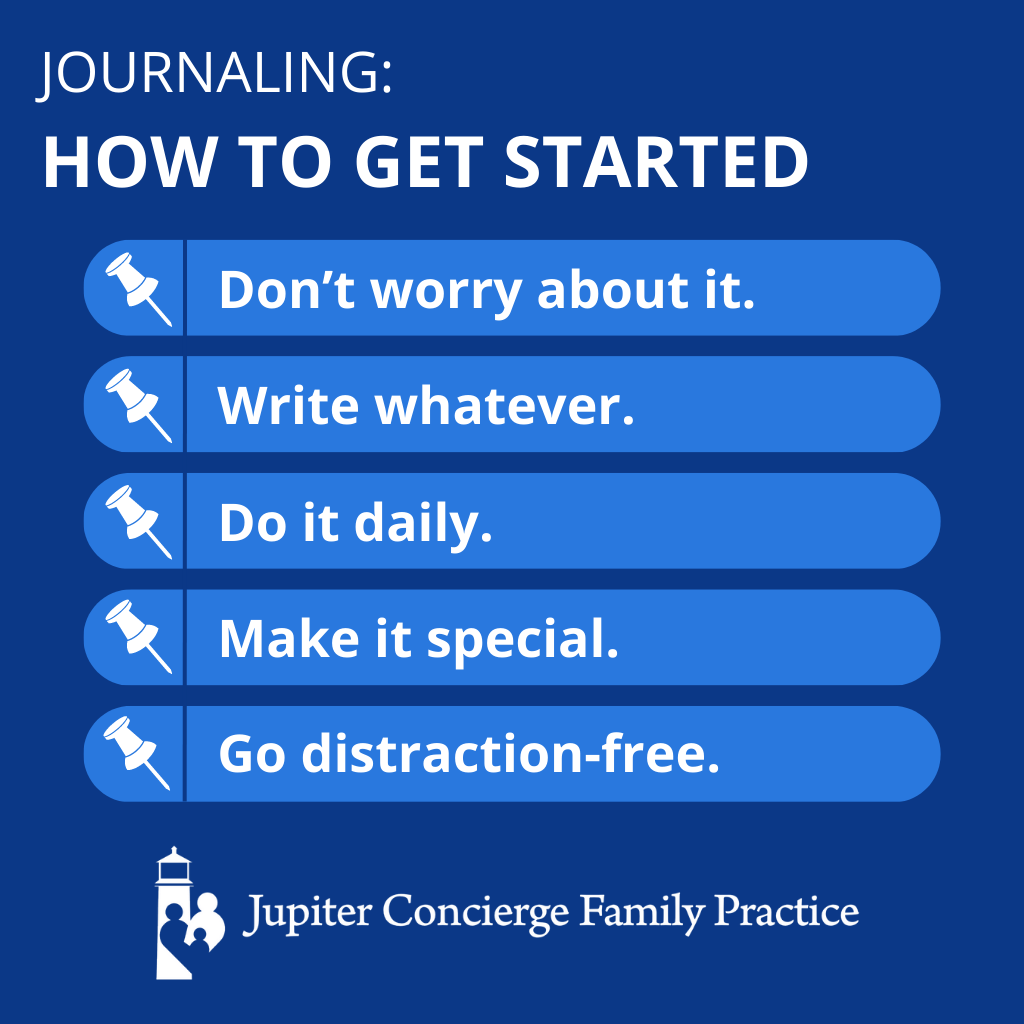
If you’ve read any of my previous blog posts, you know I emphasize the Four Pillars of Health — sleep, exercise, nutrition, and stress elimination. (An easy way to remember these pillars is to use the acronym SENSE: sleep, exercise, nutrition, and stress elimination.)
Each pillar has a direct and significant impact on health, and when not tended to, each pillar can falter, introducing threats to our well-being.
The last pillar, stress elimination, is particularly important in our modern, plugged-in world. Stress elimination can take a variety of forms. A quick internet search reveals that you can find myriad products and programs purporting to help you manage the stress in your life. And that can be very helpful.
But sometimes the simplest things we do for ourselves bring the most benefit. Today, I want to explore a free and easy exercise that can have meaningful, maximum impact on your mental health: journaling.
What Is Journaling?
Essentially, journaling is a form of meditation that both empties your mind of surface thoughts and connects your subconscious and conscious minds. We’ll go into that a little more deeply in a moment, but for now it’s useful to know that when you journal, you’re writing down — by hand, not typing — all the ideas and thoughts that come streaming into your mind.
It could be your gripes, your forgotten to-dos, things you’re grateful for, last night’s dream, a childhood memory, things you want. It could be any or all of these things, and probably will be, in some form or another.
In this type of journaling, you’re not concerned about the content. You don’t care about the grammar, punctuation, or anyone reading it in the future. It isn’t a presentation, a sales pitch, or a novel. The point is to move the pen across the page and physically write down your thoughts.
Why? Doing so clears your mind, and like all exercise practices, you need to do it regularly. Daily is best — make it part of your routine to see the benefits.
And remember, though you may go back and read it later, your journal is private. It’s not for public display. No one should see it but you.
How Can Journaling Help With Mental Health?
Journaling clears out the thoughts of yesterday and last night, giving your mind a fresh start for the day.
When you empty your mind of chattering and persistent thoughts, and when you designate a place for those thoughts to go — i.e. the page — you find clarity and mental spaciousness. When you have mental spaciousness, you can move throughout your day and solve problems more creatively.
Now, back to that somewhat abstract comment I made at the beginning of this section: journaling connects your subconscious and conscious minds. What does that mean?
When you write your thoughts down in this way, you can come back at another time and reread what you wrote. This helps you see patterns, capture ideas, and even answer questions you might not otherwise be able to figure out.
How to Get Started
I’m a big believer in the power of books to help us dig deeper into our health and personal development. Currently, I’m experimentally reading a well-known journaling book, The Artist’s Way, by Julia Cameron.
Cameron is a successful writer whose advice to handwrite three pages every morning — a practice known as Morning Pages — has become a cultural phenomenon. Cameron’s assertion is that everyone has an inner artist, and that artist is covered up.
We can take the word “artist” very liberally here. You don’t have to be a painter or a potter to benefit from this style of journaling. It means this style of journaling helps liberate the creative interests you already have, whatever they are. Maybe you know about them, and maybe you’ll discover some new ones. These creative interests could be things like tinkering in the garage, woodworking, collage, or poetry. The point is that you have an inner “artist” inside.
When you journal, you open your mind to your own innate creativity. When we uncover the art that’s inside each of us, we become like Dorothy in the Wizard of Oz who realizes, Wow, I had this power all along, and now I know how to use it!
Cameron suggests — and I agree with her — setting aside time for your journaling in the morning. The idea is to write before external events and demands begin to clutter our minds. If we wait until the middle of the day, our thoughts become disrupted.
Here are a few more tips to help you get started:
- Don’t worry about it. Forget about spelling, grammar, content, or anyone looking at it. (No one but you should ever be allowed to look at your journal.)
- Write whatever. Don’t limit yourself or try to turn brilliant phrases. Just write what comes to mind. Follow bunny trails. Go with the flow. If you can’t seem to get going, consider some writing prompts.
- Do it daily. To see real benefits from journaling, make it a daily morning practice as much as possible.
- Make it special. Get a notebook you love. Pay attention to the texture and materials so that you want to open it up every day. Make sure your pen is functional and a pleasure to write with so that it doesn’t become a nuisance.
- Go distraction-free. Write your pages away from other people and from distractions. This is your time; take it!
Journaling and Mental Health: Conclusion
Stress elimination is a vital part of a healthy lifestyle, with a big impact on all facets of health — physical, mental, and emotional.
Journaling is a practical, free, and relatively easy way to remove stress from our minds, ease mental chatter, and know ourselves better. It’s a heavy-hitter with no real drawbacks. I recommend it as a daily practice to carve out more mental space, and a great excuse to buy a nice new pen.


Dr. David Rosenberg
Dr. Rosenberg is a board-certified Family Physician who obtained a BS in Chemistry at Georgia's Mercer University in 1983 and a medical degree from the University of Miami in 1988. He completed his residency in Family Medicine at The Washington Hospital in Washington, Pennsylvania, in 1991 and then practiced Emergency Medicine at Palm Beach Gardens Medical Center for two years. In 1993 he started private practice in Jupiter.
Dr. Rosenberg has been married to his wife Mary for 38 years and they have three grown children together. Some of his interests include being a huge baseball fan, sailing, snow skiing, self-development, and learning to play piano.

